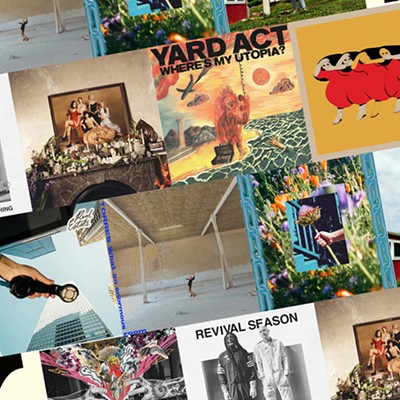Shenandoah Davis’ biography could be mistaken for a parody. “After a childhood spent being homeschooled by her mother at the foothills of the Adirondack Mountains,” as the bio on her label’s website explains, “Shenandoah Davis began teaching herself piano at the age of 3. …While she studied classical voice, piano, jazz guitar and harp during college, it was not until after graduation that she began composing on her own.”
It’s the stuff singer-songwriter fables are made of, yet in Davis’s case it’s simply the truth. The Seattle-based musician writes songs that sound like what you might expect from reading her bio: over-jangly piano, off-kilter strings. Davis warbles multi-part harmonies in a voice like that of a showgirl in a 1920s speakeasy. Her distinctive voice and quirky arrangements have garnered comparisons to Joanna Newsom and Alela Diane. You won’t hear echoes of Van Halen — even the Beatles — in her music.
“I grew up with only classical. I didn’t have exposure to any of that stuff,” she says. “I’m not trying to write classical music but it’s so much of what I know, in how I play the piano. That style of music is just kind of ingrained in my brain.”
It’s clear that despite her classical training, though, Davis now enjoys exploring the intersection between classical and popular music. In the past year she’s collaborated with the Portland Cello Project (whose repertoire ranges from Beethoven to Kanye West) and performed the Arcade Fire’s Funeral with the Seattle Rock Orchestra (and Spokane’s own Kaylee Cole) at Sasquatch!
“It amazed me to go from a listener to figuring out what part the piano came in, like ‘At 18 seconds the piano plays two B flats,’” she says of the experience. “It’s such an emotional record. You listen to it and conjure all the images it creates, or the memories of when you first heard the song. To go from that and dissect all of it changes the way that you listen to it forever.”
Though Davis’ recordings feature elaborate instrumentation, on tour she is accompanied only by long-time cellist Danah Olivetree. When we caught up with her, they had braved North Dakotan blizzards in their Honda Civic (“We slid off the road a few times”) and survived an “apocalyptic” Midwest thunderstorm to embark on a tour that would carry them from Minnesota to Portland. This trip and a subsequent jaunt through the south are a sort of reconnaissance mission, Davis says, mapping out the country and meeting people in advance of the July release of Davis’ second album, called The Company We Keep, and the four-month-long tour that will follow.
Davis has spoken in the past about her reluctance to have music become “work,” as in something you have to force yourself to do. In the middle of a grueling, driving-intensive tour, and with months of time on the road ahead, how is she feeling about her decision to pursue music full-time?
”On paper, music does look like my job. The playing, performing, writing aspect I still greatly enjoy.
It doesn’t feel like work at all,” she says, the enthusiasm clear in her voice.
“The emailing, booking, and driving part is starting to feel like work. But by 8 pm I’m so excited about the show we’re about play that night.”
Shenandoah Davis plays the Spokane for Japan Benefit (see full lineup on page 48) • Friday, April 29 at 7 p.m. • nYne Bar and Bistro • $10 • 21 • nynebar.com • 474-1621
















